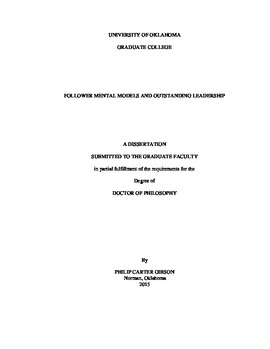| dc.contributor.advisor | Mumford, Michael | |
| dc.contributor.author | Gibson, Philip | |
| dc.date.accessioned | 2015-07-10T13:23:20Z | |
| dc.date.available | 2015-07-10T13:23:20Z | |
| dc.date.issued | 2015 | |
| dc.identifier.uri | https://hdl.handle.net/11244/15223 | |
| dc.description.abstract | Charismatic, ideological, and pragmatic (CIP) leaders use different mental models to understand and interpret the world. The present study uses this framework to gain a better understanding of how outstanding leaders interact and influence both proximal and distal followers. Participants engaged in a low-fidelity simulation, and their subsequent mental models and performance were analyzed to answer several research questions. First, how does leadership style influence creative outcomes? And second, how does leader-follower congruence of mental models relate to performance? These research questions were tested using a low-fidelity situation calling for creative problem-solving. Results indicate that leadership style does not have differential effects on follower performance but does interact with leader distance such that followers of charismatic leaders perform better with a low leader distance and followers of pragmatic leaders perform better with a higher leader distance. Lastly, mental model congruence may have some effects on the performance of followers. The implications of these findings for theory and practice are discussed. | en_US |
| dc.language | en_US | en_US |
| dc.subject | creativity | en_US |
| dc.subject | followership | en_US |
| dc.subject | leadership | en_US |
| dc.title | Follower Mental Models and Outstanding Leadership | en_US |
| dc.contributor.committeeMember | Buckley, Michael | |
| dc.contributor.committeeMember | Connelly, Shane | |
| dc.contributor.committeeMember | Terry, Robert | |
| dc.contributor.committeeMember | Day, Eric | |
| dc.date.manuscript | 2015 | |
| dc.thesis.degree | Ph.D. | en_US |
| ou.group | College of Arts and Sciences::Department of Psychology | en_US |
| shareok.nativefileaccess | restricted | en_US |
